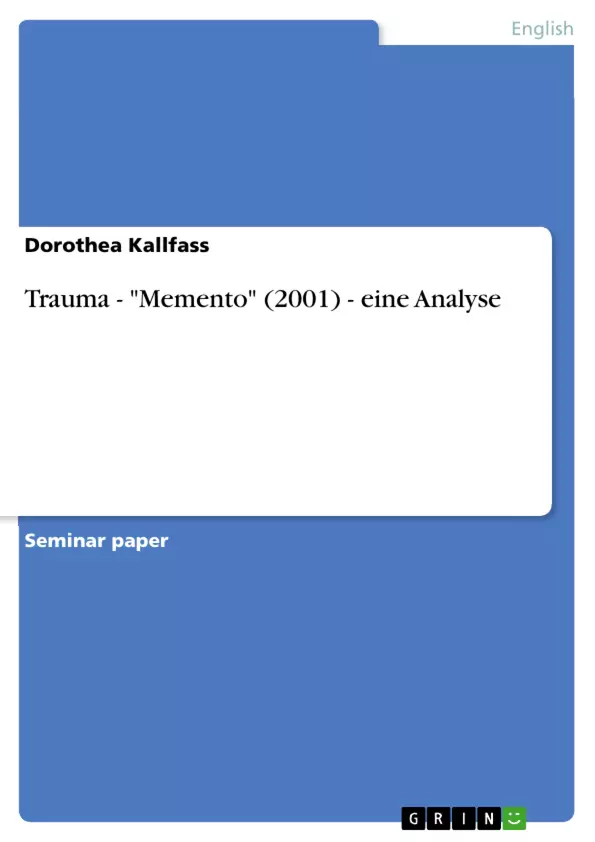The movie Memento shows the relation between overwhelming experience and psychopathology. The idea that some memories can become the nucleus of later psychopathy fascinated psychologists like Pierre Janet, and made them look closely on how the mind processes memories. The Christopher Nolan movie imitates this neural process by using different techniques: there is the backward structure with its constant overlapping and adapting of old and new information for example. Also, the mixture of black and white images frozen in space and time, together with colourful, “realistic” pictures of a developing plot, leaves the audience confused as to what is past and what is present, what is real and what is imagined. And finally, the erratic movement can be seen as an imitation of the movement of our mind when we remember.
Inhaltsverzeichnis (Table of Contents)
- The movie MEMENTO (2001) by Christopher Nolan introduces a hero torn to pieces:
- The concept of a map guiding us through life, written by our previous experiences and the memories thereof is also a concept of psychology and neurology.
- Leonard evidently lost his map and now cannot find his way around the world anymore, his interaction with the environment has become either a threat to himself (that's why he doesn't answer the phone anymore) or a threat to the other person/s involved (several examples for his violent behaviour against others can be seen in the movie).
- We learn early in the film that Leonard can't remember anything new after the trauma he experienced when his wife died.
- The movie provides an impressive sequence for this statement which I am going to discuss.
- The above described film sequence can also be placed into a broader context of our seminar: when talking about collective memory, so-called containers for this kind of memories have been mentioned.
Zielsetzung und Themenschwerpunkte (Objectives and Key Themes)
The paper aims to analyze Christopher Nolan's film Memento (2001) through the lens of psychological and neurobiological theories of memory, particularly focusing on the concept of trauma and its impact on identity and behavior. The analysis delves into the protagonist's struggle with a fragmented memory and its consequences for his perception of reality, his relationships, and his actions.
- Trauma and Memory
- Dissociation and Identity Formation
- Collective Memory and Containers for Memories
- Psychopathology and the Impact of Trauma
- The Role of Narrative and Memory Reconstruction
Zusammenfassung der Kapitel (Chapter Summaries)
- The film introduces Leonard, a man suffering from anterograde amnesia, unable to form new memories after a traumatic event.
- Leonard's inability to remember new information is compared to the loss of a mental map, leading to a breakdown in his interaction with the environment.
- The film explores the concept of traumatic memory, highlighting how overwhelming experiences can lead to a fragmented and unassimilated state of consciousness.
- Leonard's quest for revenge against the perpetrator of his wife's death becomes his fixed idea, driving his actions and shaping his perception of the world.
- The film delves into the concept of dissociation, where traumatic experiences lead to a separation of memory from conscious awareness and voluntary control.
- The film sequence involving Leonard's burning of his wife's belongings symbolizes his struggle with loss, loneliness, and the fear of losing his identity.
- The film emphasizes the importance of memory for constructing identity and how its disruption can lead to psychological instability and disconnection from society.
- The analysis explores how Leonard's reliance on physical objects and re-enactments as containers for his memories reflects the broader concept of collective memory and its various forms.
Schlüsselwörter (Keywords)
The main keywords and focus topics of the text include: trauma, memory, dissociation, identity, psychopathology, collective memory, narrative, film analysis, Memento (2001), Christopher Nolan, Pierre Janet, van der Kolk and van der Hart, containers for memories, fixed ideas, re-enactment, anterograde amnesia.
Frequently Asked Questions
How does the movie "Memento" portray memory trauma?
The film uses a backward narrative structure and erratic movements to imitate the fragmented neural processes of a mind suffering from anterograde amnesia and trauma.
What is the psychological concept of the "mental map"?
It refers to the internal guidance system written by our memories. In the movie, the protagonist Leonard has lost this map, leading to a breakdown in his interaction with reality.
What role does dissociation play in the film?
The analysis explores how traumatic experiences can lead to a separation of memory from conscious control, a concept famously studied by Pierre Janet.
What are "containers for memories" in the context of Memento?
Leonard uses tattoos, polaroids, and notes as physical containers to replace his biological memory, reflecting theories of collective and externalized memory.
Why does the movie mix black-and-white with color images?
The mixture confuses the audience's perception of past and present, real and imagined, mirroring the protagonist's own disorientation and fragmented state of consciousness.
- Quote paper
- Dorothea Kallfass (Author), 2004, Trauma - "Memento" (2001) - eine Analyse, Munich, GRIN Verlag, https://www.grin.com/document/89094



